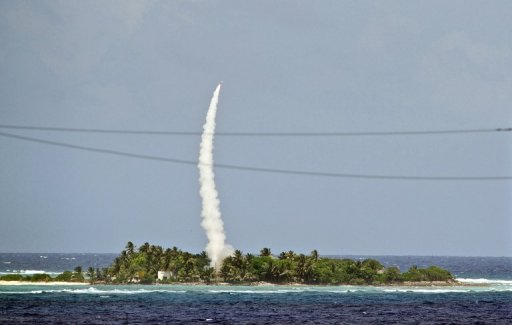(AFP) – The United States is ready to abandon the final phase of its European missile defense system, a US official said Saturday, in a move that could revive arms control talks with Russia.
As part of plans announced Friday to deploy more anti-missile batteries in Alaska to thwart potential strikes from North Korea, the United States intends to “restructure” its missile defense program in Europe, an administration official said.
President Barack Obama’s plan for Europe had envisaged SM-3 interceptors on land and sea that would be upgraded and improved over four stages.
The final phase of the missile-killing interceptor, known as SM-3 IIB, was due to be deployed within about 10 years in Poland and possibly Romania, with a more powerful booster rocket and other advanced hardware.
But the final phase “is being restructured due to congressional funding cuts and changing technology,” the administration official, who spoke on condition of anonymity, told AFP.
“The goal is to research what alternative there could be to the original SM-3 IIB plan,” the official said.
The decision could raise concerns in Poland and Romania but likely will be welcomed in Moscow, as Russian officials had seen the more sophisticated interceptor as aimed at its missile arsenal and undercutting its nuclear deterrent.
The issue had become an obstacle to any progress on further arms control agreements and analysts say scrapping the final block of interceptors could create momentum for fresh negotiations.
But the administration official insisted the decision was based on financial and technical considerations and not meant as a signal to Moscow.
“This has never been about Russia but about missile defense for our allies in Europe against threats from Iran,” the official said.
A year ago, Obama told Russian President Dmitry Medvedev that he would have “more flexibility” to negotiate with Moscow after America’s November elections, in a remark picked up by a nearby microphone.
His comment sparked sharp criticism from Republicans in Congress and the administration’s decision to move away from the final phase of the missile defense blueprint in Europe will ignite fresh anger among lawmakers.
Apart from Moscow’s objections, the science behind the planned final phase of the SM-3 interceptor has come under increasing scrutiny.
The Defense Science Board, a panel of civilian experts, said in 2011 that the concept of the more advanced SM-3 — to intercept missiles at an early stage before the deployment of warheads — would require “Herculean effort and is not realistically achievable, even under the most optimistic set of deployment, sensor capability, and missile technology assumptions.”

COMMENTS
Please let us know if you're having issues with commenting.